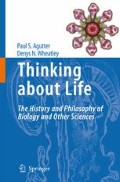Living organisms act purposefully, and their individual parts — organs, cells, organelles, molecules — fulfil purposes for the whole. Those purposes ‘come from within’; animals, for example, seek food and mates for themselves. In contrast, the purposes of technological products such as drawing pins, hat-stands and washing machines ‘come from outside’; they are defined by their makers and users. A washing machine does not wash clothes for itself.
Ever since the Scientific Revolution it has been agreed that the inanimate world of rocks, rivers, stars, clouds etc. does not act purposefully. It is to be understood in mechanistic not teleological terms. An inanimate object is not for anything or anyone; whatever it does is a consequence of antecedent causes. That implies a basic difference between biology on the one hand and physics and chemistry on the other. If biology is to be wholly compatible with physics, that difference needs to be resolved. We must be able to make complete mechanistic sense of purpose in biology.
Access this chapter
Tax calculation will be finalised at checkout
Purchases are for personal use only
Preview
Unable to display preview. Download preview PDF.
Reference
Allen C, Lauder G (eds) (1993) Nature's Purposes. MIT Press, Cambridge, MA.
Crick F (2004) Of Molecules and Men. Promethius Books, New York.
Mayr E (1972) The Growth of Biological Thought: Diversity, Evolution and Inheritance. Harvard University Press, Cambridge, MA.
Monod J (1970) Chance and Necessity. Random House, New York.
Nagel E (1979) Teleology Revisited, and Other Essays in the Philosophy and History of Science. Columbia University Press, New York.
Taylor R (1966) Action and Purpose. Prentice-Hall, Englewood Cliffs, NJ.
Woodfield A (1976) Teleology. Cambridge University Press, Cambridge.
Wright L (1976) Teleological Explanation. University of California Press, Berkeley, CA.
Rights and permissions
Copyright information
© 2008 Springer Science + Business Media B.V
About this chapter
Cite this chapter
(2008). The Problem of Purpose. In: Thinking about Life. Springer, Dordrecht. https://doi.org/10.1007/978-1-4020-8866-7_15
Download citation
DOI: https://doi.org/10.1007/978-1-4020-8866-7_15
Publisher Name: Springer, Dordrecht
Print ISBN: 978-1-4020-8865-0
Online ISBN: 978-1-4020-8866-7
eBook Packages: Humanities, Social Sciences and LawPhilosophy and Religion (R0)

